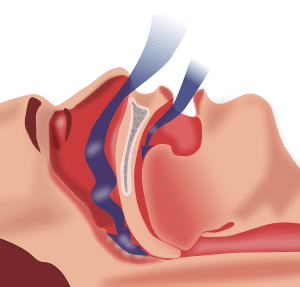What is sleep apnea?
Sleep apnea is a sleep disorder that causes breathing problems. Your breathing may stop and start repetitively as the upper airways collapse during you sleep. The person suffering from sleep apnea will feel tired even after a full night.
-

The link between sleep apnea and weight loss

Left untreated, obstructive sleep apnea can also increase your risk of high blood pressure, stroke, and heart disease.
How are sleep apnea and weight loss related?
If we examine the relationship with body weight, we can see that sleep apnea and weight gain have a cyclic relationship. So we can say that obesity increases the risk of sleep apnea, but there could also be another side that your body gains excess weight while you have sleep apnea.
When overweight and obese people lose weight, both sleep apnea and other health problems [like heart disease] go away.
Losing as little as 10% of your body weight can have a major impact on sleep apnea symptoms. In some cases, losing a significant amount of weight can even cure the condition.
What is sleep apnea therapy? In one type of illness, losing weight is the most effective way to reduce sleep apnea symptoms.
Weight loss may not be a fancy high-tech treatment, but it is an excellent therapy for patients with sleep apnea. It is an effective long-term treatment for patients.
Here are some things that can help manage sleep apnea:
•Healthy eating
•A practice
•weight loss
• No stress and no depression
• Maintaining the sleep-wake cycle
• Continuous positive airway pressure or CPAP .
It may not be a complete cure in every case, but it does have a beneficial effect. If we’ve made significant lifestyle changes through losing weight, it may be time to reevaluate treatment.
It’s because losing weight does a pretty decent job of curing sleep apnea.
If we’ve lost a significant amount of weight, we may need a lower Pap pressure to keep our airways open, or we may no longer need treatment at all.
People who lose the recommended amount of weight are three times more likely to achieve complete remission of sleep apnea symptoms than people who don’t lose weight.
It doesn’t take a lot of weight gain to take a patient from chronic snoring to sleep apnea, but it doesn’t take a lot of weight loss to improve symptoms either.
Sustained weight loss not only improves sleep apnea but also the many other independently linked comorbidities such as high blood pressure, high cholesterol and diabetes.
A weight loss of just 10-15% can reduce the severity of sleep apnea by 50% in moderately obese patients.
Unfortunately, while weight loss can bring about a full recovery from sleep apnea, many sleep apnea sufferers require additional therapies. Side Effects and Disadvantages of Sleep Apnea:
•High blood pressure.
• Stroke .
• Heart failure, irregular heartbeat and heart attack.
•Diabetes.
• Depression.
• Worsening of ADHD.
• Headache.

